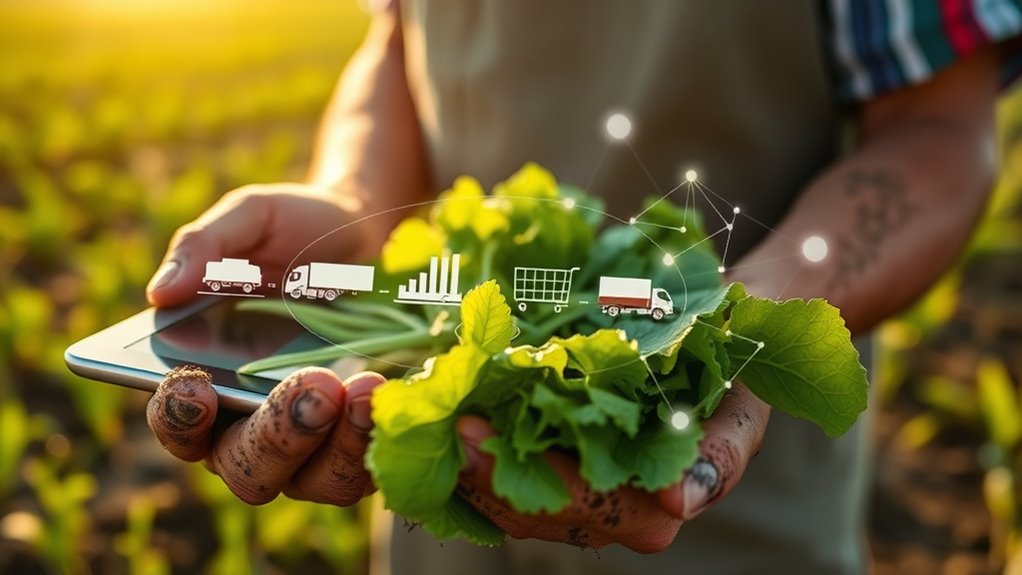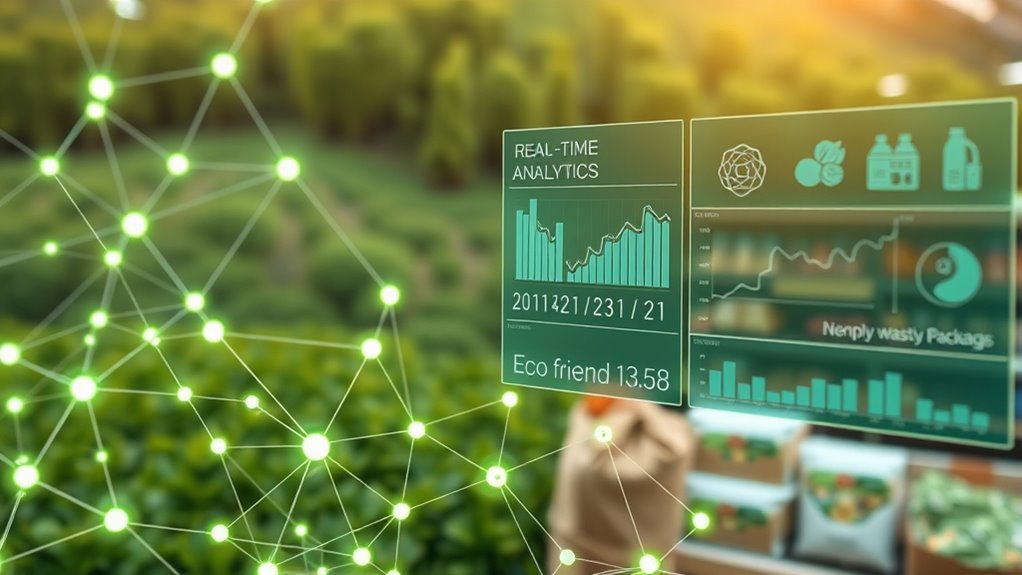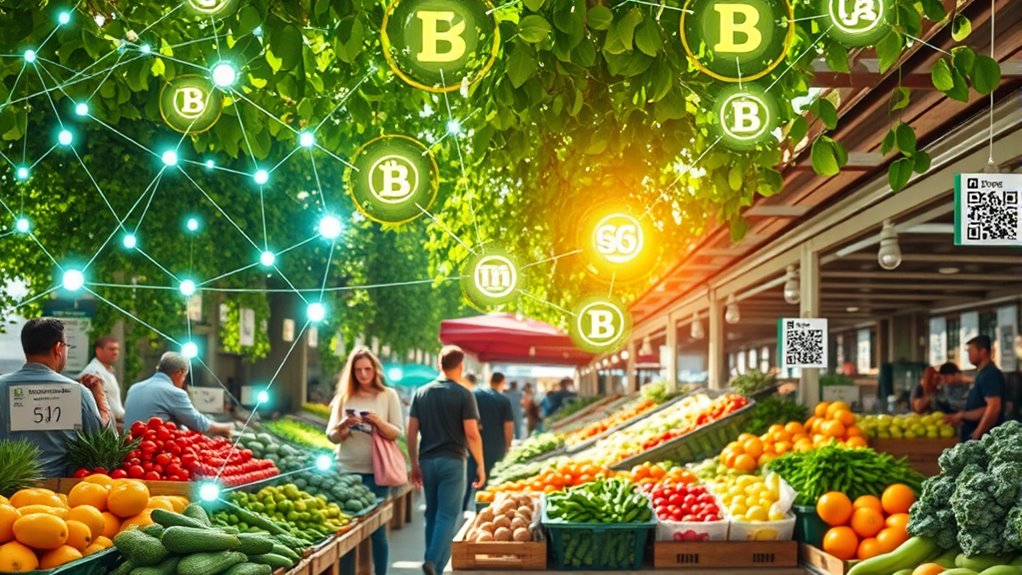Blockchain plays a vital role in creating sustainable supply chains by enhancing transparency and traceability. It allows you to track products from origin to final destination, ensuring ethical sourcing and accountability. With real-time data access, you can identify issues quickly and reduce waste. Smart contracts automate compliance, improving efficiency and collaboration among all stakeholders. Discover how these features can revolutionize your supply chain practices and contribute to environmental responsibility in the industry.
Key Takeaways
- Blockchain enhances transparency, allowing real-time access to supply chain data, which helps ensure compliance with sustainability standards.
- It improves traceability, enabling consumers to verify the origins of products and make informed choices regarding environmental impact.
- By automating processes through smart contracts, blockchain reduces the need for intermediaries, lowering costs and increasing operational efficiency.
- The technology minimizes waste by providing accurate data on inventory levels and product movement, streamlining supply chain processes.
- Enhanced collaboration with suppliers through transparent data sharing fosters trust and encourages sustainable practices across the entire supply chain.
Understanding Blockchain Technology

As you delve into the world of blockchain technology, you'll discover it's more than just the backbone of cryptocurrencies.
It's a decentralized ledger that records transactions across multiple computers, ensuring transparency and security. Each block in the chain contains a list of transactions, which are linked to previous blocks, forming an unchangeable record. This structure prevents tampering and fraud, making it reliable for various applications beyond finance.
Smart contracts, self-executing agreements coded onto the blockchain, automate processes and reduce the need for intermediaries. By understanding these fundamental aspects, you'll appreciate how blockchain can revolutionize industries.
Its potential extends to improving efficiency, enhancing traceability, and fostering trust in countless transactions, paving the way for innovative solutions across sectors.
The Importance of Sustainability in Supply Chains

Sustainability in supply chains has become a priority for businesses aiming to meet consumer demands and regulatory requirements. You'll find that consumers are increasingly choosing brands that prioritize environmental responsibility.
By adopting sustainable practices, you not only enhance your brand image but also build customer loyalty. Additionally, regulatory pressures are mounting; companies that fail to comply with sustainability standards risk facing penalties and losing market share.
Sustainable supply chains also promote efficiency, reducing waste and lowering costs in the long run. Embracing sustainability helps mitigate risks associated with resource scarcity and environmental impact.
Ultimately, focusing on sustainability isn't just a trend—it's a strategic move that can drive innovation and long-term success in today's competitive landscape.
Enhancing Transparency Through Blockchain

When businesses implement blockchain technology in their supply chains, they unlock a powerful tool for enhancing transparency. This decentralized ledger allows all participants to access real-time data, ensuring everyone's on the same page.
You can track every transaction, from raw materials to finished products, and verify authenticity without relying on intermediaries. By reducing the risk of fraud and errors, blockchain fosters trust among suppliers, manufacturers, and consumers.
Additionally, smart contracts automate compliance, ensuring that agreements are honored without delays. This increased visibility not only helps you make informed decisions but also strengthens your brand reputation.
Smart contracts streamline compliance and enhance transparency, empowering informed decision-making and bolstering your brand's reputation.
Ultimately, embracing blockchain technology positions your business as a leader in transparent, responsible supply chain practices, aligning with modern consumers' demands for accountability.
Traceability: From Farm to Table

Blockchain technology not only enhances transparency but also significantly improves traceability in supply chains, particularly in the food industry.
When you trace a product from farm to table, you can verify each step of its journey. This means knowing where ingredients come from and how they were handled.
By using blockchain, you get an immutable record of each transaction, ensuring that all parties involved—farmers, processors, distributors, and retailers—are accountable.
It empowers you to make informed choices, fostering trust with consumers who want to know the origin of their food.
With real-time data at your fingertips, you can quickly address any issues, ensuring safety and quality while reinforcing sustainable practices throughout the supply chain.
Reducing Waste and Improving Efficiency

As companies strive to reduce waste and improve efficiency, integrating blockchain into supply chains can be a game changer. By providing real-time data on inventory levels and product movement, blockchain helps you identify bottlenecks and streamline processes.
You can track materials from origin to destination, minimizing excess stock and preventing spoilage.
With smart contracts, you automate processes that reduce human error, saving time and costs. Enhanced transparency allows you to collaborate better with suppliers, ensuring that everyone's on the same page.
Promoting Ethical Sourcing Practices

While many companies seek to enhance their sustainability efforts, promoting ethical sourcing practices becomes crucial to building trust with consumers and partners.
By leveraging blockchain technology, you can ensure transparency in your supply chain, allowing stakeholders to trace the origin of materials and verify their ethical standards. This not only helps eliminate exploitation and environmental harm but also strengthens your brand's reputation.
Implementing smart contracts can streamline supplier agreements, ensuring compliance with ethical sourcing policies. Additionally, showcasing your commitment to ethical practices through blockchain can attract socially conscious consumers who prioritize responsible sourcing.
Ultimately, by prioritizing ethical sourcing, you're not just meeting consumer demand; you're fostering a more sustainable and equitable supply chain that benefits everyone involved.
Building Trust Among Stakeholders

Building trust among stakeholders is essential for fostering collaboration and ensuring the long-term success of sustainable supply chains.
When you utilize blockchain technology, you create a transparent and secure environment where all parties can access real-time data. This transparency allows you to verify the authenticity of products and the ethical practices behind them.
By sharing information openly, you can eliminate doubts and foster confidence among suppliers, manufacturers, and consumers alike. As trust builds, stakeholders are more likely to engage in collaborative efforts, share resources, and innovate together.
Open information sharing cultivates trust, encouraging collaboration and innovation among suppliers, manufacturers, and consumers.
Ultimately, a trustworthy supply chain not only enhances brand reputation but also drives sustainability, ensuring that all participants benefit from a shared commitment to ethical practices.
Future Trends: Blockchain and Sustainable Supply Chains

With the rapid evolution of technology, blockchain is set to transform sustainable supply chains in remarkable ways.
You'll see increased transparency, enabling you to track products from source to shelf. This can boost consumer trust, as they'll know exactly where their goods come from and how they're made.
Additionally, smart contracts will automate compliance with sustainability standards, making it easier for you to adhere to regulations.
As more businesses adopt blockchain, collaborative networks will form, enhancing information sharing and minimizing waste.
You'll also notice an uptick in innovative solutions, like carbon tracking and circular economy initiatives, allowing you to contribute to environmental goals.
Embracing these trends could redefine your approach to sustainability in supply chains.
Frequently Asked Questions
How Does Blockchain Impact Consumer Behavior Towards Sustainable Products?
Blockchain impacts your behavior towards sustainable products by increasing transparency and trust.
You're more likely to choose products when you can verify their origins and the ethical practices behind them. This technology allows you to track a product's journey from source to shelf, helping you make informed decisions.
When you see proof of sustainability, you're motivated to support brands that align with your values, ultimately driving demand for eco-friendly options.
What Are the Costs Associated With Implementing Blockchain in Supply Chains?
Implementing blockchain in supply chains can involve several costs that you should consider.
First, there's the initial setup expense, including software and hardware investments.
You'll also face ongoing maintenance costs and potential training expenses for your team.
Additionally, integrating blockchain with existing systems can require further investments.
Lastly, you may encounter transaction fees as you process data on the blockchain, which can add up depending on your operational volume.
Can Blockchain Technology Be Integrated With Existing Supply Chain Systems?
You might think integrating blockchain into your existing supply chain systems is too complex or costly, but it's actually quite feasible.
Many companies have successfully adopted blockchain alongside current technologies, enhancing transparency and efficiency.
By utilizing application programming interfaces (APIs) and working with compatible software, you can create a seamless transition.
This integration not only boosts your operational capabilities but also positions your business as a leader in innovation and trust within the market.
What Industries Are Most Likely to Benefit From Blockchain in Sustainability?
You'll find that industries like agriculture, fashion, and energy can greatly benefit from blockchain's transparency and traceability.
In agriculture, it can ensure the origin of products, enhancing food safety.
The fashion industry can use it to verify ethical sourcing and reduce waste.
In energy, blockchain can streamline transactions and promote renewable resources.
Are There Any Legal Implications of Using Blockchain in Supply Chains?
You'd think using blockchain in supply chains would be all smooth sailing, but legal implications can throw a wrench in the works.
You might face issues like data privacy, compliance with regulations, and the challenge of smart contracts. If you're not careful, you could find yourself tangled in legal disputes.
Conclusion
In conclusion, blockchain's bright potential can transform sustainable supply chains, driving transparency, traceability, and trust. By embracing this innovative technology, you can enhance efficiency, reduce waste, and promote ethical sourcing practices. As you explore these exciting possibilities, remember that the future of your supply chain not only hinges on the technology but also on your commitment to conscientious choices. Together, let's cultivate a cleaner, more conscious world, one block at a time.









